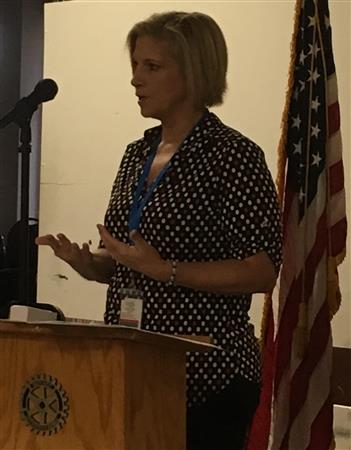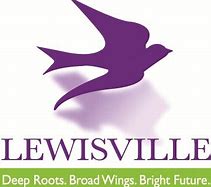Phyllis Finley of Denton County MHMR
provided excellent summary to
Mental Health services offered in Denton County
regardless of ability to pay.
Recent events in our society have highlighted the need for effective mental health services. We in Denton County are blessed to have Denton County MHMR. Phyllis Finely provided an excellent summary to our members at yesterdays meeting. We all need to communicate to your family, friends and neighbors that mental care help is available in our county regardless of ability to pay. To see a full summary of services offered, click here.
Here is some additional information regarding MHMR Services.
Denton County MHMR Mental Health Services
Eligibility and Intake:
People with mental health needs access our services through our hotline/intake line (1-800-762-0157). This line operates 24 hours a day and provides an initial screening for individuals to determine if clients are in crisis or in need of ongoing mental health services. Individuals who qualify based on need and diagnosis are referred to our open intake process. Intake consists of a diagnostic assessment, psychosocial history, and a uniform assessment of level of care that is required by the state. The Uniform Assessment used is either the Adult Needs and Strengths Assessment (ANSA) or the Children’s Assessment of Needs and Strengths (CANS). The scores on the ANSA/CANS determine the level of care that is appropriate for the individual at that time.
Levels of Care Adult:
The levels of care for our adult and children’s services are delineated by acuity of need and are labeled Level of Care 1, 2, 3 or 4. The higher the level of care assigned the more acute the need of the client and the more services that are available to them. A general outline of the levels of care and services provided in each level of care is presented below:
Level of Care 1: The general focus of this array of services is to facilitate recovery by reducing or stabilizing symptoms, improve the level of functioning, and/or prevent deterioration of the individual’s condition. Natural and/or alternative supports are developed to help the individual in their recovery. Services are most often provided in outpatient, office-based settings, and are primarily limited to medication, rehabilitative services, and education. We currently have 1,813 clients in this level of care.
Level of Care 2: The overall focus of services in this level care is to improve level of functioning and/or prevent deterioration of the individual’s condition so that the individual is able to continue to work towards identified recovery goals. Natural and/or alternative supports are developed to help the individual in their recovery process. Services are most often provided in outpatient, office-based settings and include psychotherapy services in addition to those offered in LOC-1. We currently have 118 clients in this level of care. We have five PRN counselors who provide cognitive behavioral therapy.
Level of Care 3: Services in this level of care are generally intended for individuals who enter the system of care with moderate to severe levels of need who require intensive rehabilitation to increase community tenure, establish support networks, increase community awareness, and develop coping strategies in order to function effectively in their social environment (family, peers, school). This may include maintaining the current level of functioning. A rehabilitative case manager who is a member of the therapeutic team provides supported housing and Co-Occurring Psychiatric and Substance Abuse Disorders (COPSD) services, if needed. We currently have 165 clients in this level of care.
Jail Diversion Case Management: We have two dedicated case managers who work closely with jail staff to receive referrals and connect the individuals to our mental health outpatient services. These individuals can be in any of our levels of care where services provided can include case management, skills training, psychosocial rehab, psychiatric services including medication management, counseling, education, and COPSD. The goal is to reduce the recidivism of these individuals going back into the jail setting and increase their level of functioning.
Pre-Admission Screening and Resident Review (PASRR):
This service is provided by the center for clients who are in nursing homes who may have mental health needs. Our role is to assess if the client does have mental health issues, monitor the current treatment of the services being provided, and supplement the care that is received if it is determined that the nursing home or facility cannot accommodate all of the mental health needs. The initial assessments for these clients is a fee for service payment model, however the ongoing service coordination is funded through general revenue. Although all the case managers are trained to complete PASRR, we have one case manager dedicated to holding this caseload. Adult case managers have mixed caseloads and see individuals in all levels of care. We currently have 19 case managers in this program, of which two of them are dedicated to Jail Diversion program and one case manager dedicated to PASRR.
Level of Care 4: Using an integrated services approach, the Assertive Community Treatment (ACT) team merges clinical and rehabilitation staff expertise (e.g., psychiatric, substance abuse, employment, and housing) within a mobile service delivery team that works in partnership with the person in recovery from his or her home. Accordingly, there will be minimal referral of individuals to other programs for treatment, rehabilitation, and support services. Limited use of group activities designed to reduce social isolation or address substance use/abuse issues is also acceptable as part of ACT. We currently have 46 clients in this level of care. We have 5 case managers, 2 nurses, and 1 psychiatrist for this team. The psychiatrist for this team is Denton County MHMR’s medical director.
Clients in all the above levels of care also receive psychiatric, nursing, peer support, medication management and crisis services as part of their level of care.
These services are funded through general revenue funds for uninsured or reimbursed through Medicaid or Medicare. Only 18% of our current adult client population has Medicaid.
Collective Opportunities to Manage Psychosis by Adapting, Sustaining, and Succeeding (COMPASS)
This is a new Coordinated Specialty Care program serving 20-30 individuals, between the ages of 15-30, experiencing their first psychotic episode. This program consists of a Licensed Professional of Healing Arts (LPHA), who will serves as the team lead, a Supported Education and Employment Specialist (SEES) who focuses on education and employment goals, and a primary clinician focusing on skills training and coordination of services. Individuals in this program will also have access to our Psychiatrist, Nurses, Peer Support Specialist, and Family Partner. This program is funded by HHSC. This program started at the end of April 2018 and currently has 12 clients.
Levels of Care Children:
Level of Care 1: The services in this LOC are intended to meet the needs of the child/youth whose only identified treatment need is for medication management. Children/youth served in this LOC may have an occasional need for routine case management services but do not have ongoing treatment needs outside of medication related services. While services delivered in this LOC are primarily office based, services may also be provided at school or in the community. We currently have 84 clients assigned to this level of care.
Level of Care 2: The purpose of this LOC is to improve mood symptoms or address behavioral needs while building strengths in the child/youth and caregiver. The services in the LOC target a specific, identified treatment need. Services should be provided in the most convenient location for the child/youth and caregiver, including the office setting, school, home, or other community location. We currently have 104 individuals assigned to this level of care.
Level of Care 3: The purpose of this LOC is to reduce or stabilize symptoms and/or risk behaviors, improve overall functioning, and build strengths and resiliency in the child/youth and caregiver. Services should be provided in the most convenient location for the child/youth and caregiver, including the office setting, school, home, or other community location. Providers may need to consider flexible office hours to support the complex needs of the child/youth and caregiver. We currently have 39 individuals in this level of care.
Level of Care 4: The purpose of this LOC is to reduce or stabilize symptoms and/or risk behaviors, improve overall functioning, and build strengths and resiliency in the child/youth and caregiver through a treatment team approach. Services should be provided in the most convenient location for the child/youth and caregiver, including the office setting, school, home, or other community location. Providers may need to consider flexible office hours to support the complex needs of the child/youth and caregiver. We currently have 13 individuals assigned to this level of care.
Level of care Young Children: The services in this LOC are intended to meet the needs of the young child (ages 3-5) with identified behavioral and/or emotional treatment needs. The young child may also exhibit a moderate degree of life domain functioning impairments that require multiple service interventions. The purpose of this LOC is to reduce or stabilize symptoms, improve overall functioning, and build strengths and resiliency in the child and caregiver. The focus of services is placed on the dyad relationship as this relationship is the primary context for young children. These primary relationship(s) set the stage for future social-emotional behavior and future relationship behavior. Services should be provided in the most convenient location for the child and caregiver, including the office setting or home. We currently have 6 individuals in this level of care.
YES WAIVER:
The YES Waiver is a Medicaid waiver program for children with mental health. This program provides services including intensive case management, psychiatric services, wraparound services, adaptive aids and supports, community living supports, family supports, respite, and many other types of alternative therapies with the goal of helping a child who is at risk of placement. The waiver services are funded through Medicaid. Denton County MHMR contracts with other providers to provide choice for clients in their service providers. We currently have 10 individuals in this program. We have three staff dedicated to these clients.
Children’s case managers have mixed caseloads and see individuals in all levels of care. We currently have 9 case managers in this program, with three of them being dedicated to the YES Waiver program.
Clients in all the above levels of care also receive psychiatric, nursing, medication management, family partner services, and crisis services as part of their level of care.
These services are funded through general revenue funds for uninsured or reimbursed through Medicaid or Medicare. 72% of our current client children’s population has Medicaid.
CRISIS SERVICES
Our Crisis services are provided 24 hours a day, throughout the county. These services are typically provided in the community or in alternative treatment environments such as schools, hospitals, and jails. The initial assessment through crisis services is to help people experiencing a psychiatric crisis through assessment and problem solving. Our crisis services help facilitate higher levels of care such as hospitalization, if needed. These services can include facilitation of those needing hospitalization who have insurance or payment for hospitalization for those who are uninsured. As the initial crisis period is alleviated clients are transitioned to outpatient crisis services (that can last up to 90 days) that include psychiatric, nursing, case management and skills training, cognitive behavioral therapy and referrals. Currently, there are 83 individuals service in crisis services, level of care 5. Once a client is finished with outpatient crisis services they are transitioned to the appropriate level of care within our outpatient services or referred to the community.
Continuity of care and court liaisons work with clients who are going to local hospitals or to state hospitals to ensure that there is continuity of their inpatient care and outpatient services. Additionally, they monitor the care at the state hospital and are part of the treatment team at the state hospital.
There are two Licensed Chemical Dependency Counselors (LCDC) on staff. One LCDC facilitates substance abuse groups four times a week and meets with individuals in all levels of care. Our other LCDC position is grant funded by Health and Human Services Commission (HHSC) and is dispatched with the Mobile Crisis Outreach Team to conduct substance abuse assessments and facilitate placement if needed.
Texas Correctional Office on offenders with Medical or Mental Impairment (TCOOMMI):
The purpose of this program is twofold. The first purpose is to coordinate transitioning of mental health care for offenders leaving the state correctional department and reintegrating back to their communities. The second purpose is to have collaborative approach with Parolees, their parole officer and our services to ensure that the specific needs of this population are met. The goal of this collaboration is safe reintegration to the community and to cut down on jail recidivism. The funding for this program comes mainly through a contract with Texas Department of Criminal Justice. We have one case manager assigned to the clients in this program dedicated to teaching skills needed to safely and successfully reintegrate into the community. The program also has a continuity of care coordinator responsible for intakes into the program. The number of clients in this program is 23. TCOOMMI contracts with the center for these services.
Youth Mental Health First Aid:
This program is an 8-hour evidenced-based public education program that introduces participants to risk factors and warning signs of mental illnesses for adolescents and transition you, ages 12-18. The course builds an understanding of the importance of early intervention and teaches participants how to offer initial help to a young person experiencing a mental health challenge. This program is taught by our trained staff to educators throughout the county. The recent legislative session also made it possible for us to deliver this training to those who teach in the university or college settings. This program has a dedicated staff member focusing on community outreach in order to increase the number of school personnel training in Mental Health First Aid. The materials, training, and staff are funded through our mental health contract with Health Human Service Commission (HHSC).
Local Psychiatric Bed Days/Diversion Beds:
This program is designed to allow clients to receive inpatient psychiatric care in local hospitals rather than being sent to the state hospital. Keeping an individual closer to their community and support systems helps to ensure better integration back to the community upon discharge from a psychiatric facility as well as helping to cut down the number of beds used at the state facilities. The state hospitals are almost always full and this funding helps to keep individuals from waiting for inpatient services. This local hospitalization also cuts transportation costs for agencies involved in the clients care. This is funded through our mental health contract with the state. This funding does not cover all the costs occurred by Denton County MHMR for bed day utilization. The state hospitals are often full, or on diversion which means that an individuals who needs state hospital care may be diverted as far away as El Paso or continue to utilize a local psychiatric bed. The cost to the center for these local beds far exceeds the amount funded through this program. The safety of individuals and communities is at risk when individuals are unable to access inpatient psychiatric care. North Texas State Hospital (NTSH) is the Center’s catchment hospital. These services are funded through HHSC competitive grant.
Connections: Housing and Urban Development (HUD)
The connections program is a permanent supportive housing grant that is managed by Denton County MHMR. The goal is to move chronically homeless individuals with disabilities towards self-sufficiency and independence by using an integrated approach. The services include case management, life skills, psychiatric services, housing, therapy, transportation and food pantry. This program has two fulltime staff and approximately 24 clients and 1 family. The funding for this program comes from a grant through HUD.
Local Outreach to Suicide Survivors (LOSS TEAM):
Our LOSS team is a program that works to reach out to families and loved ones who have experienced a recent suicide loss. The LOSS team responds with the medical examiner to provide comfort and support for families who have lost someone to suicide. This team, made up of a suicide survivor and a trained clinician respond and work with family members so that police and medical examiners can do their job at a suicide scene. The goal of the LOSS team is to begin the process of healing for the family and to make sure that they have resources and access to ongoing care that they may need following the traumatic event of suicide. The LOSS team also provides delayed response activities that help support and link affected family members with appropriate resources. The team conducts follow up calls for up to 1 year following the suicide death, providing loved ones with much needed support. This program is funded through donations and fundraising at the local level.
Projects funded through the 1115 Waiver:
Crisis Residential
The Crisis residential program is a psychosocial rehabilitation program providing treatment for 12 individuals (6 females and 6 males) who pose some risk of harm to themselves, posing some functional impairment, and are unable to be stabilized in a less restrictive environment. This program provides up to 8 hours a day of skills training, process groups, and substance abuse groups. Individuals are also able to see a psychiatrist and receive nursing services. The facility itself is not locked however it is a monitored 24 hours a day by staff to ensure that individuals are safe and not in need of a higher level of care. This program offers services for individuals between 7-14 day stay. This program has been funded by the 1115 grant. It received reduced funding for 2019 and will require additional funding to continue operating past September 2020.
Psychiatric Triage Center
The Psychiatric triage center offers a 24 hour walk-in option for people who are in psychiatric crisis. Individuals can come to the psychiatric triage for an assessment which determines the least restrictive environment the person can receive care. The psychiatric triage allows for law enforcement to bring individuals to the facility rather than hospital emergency rooms cutting down on both law enforcement time and hospital utilization. This process allows for individuals to begin receiving appropriate services within minutes of arrival rather than waiting for care in settings that might not be appropriate such as jails, hospitals, or other community settings. This program has been funded by the 1115 grant. It received reduced funding in 2019 and will require additional funding to continue operating past September 2020.
Integrated Health Clinic
The Integrated clinic provides individuals with a one stop option for both psychiatric and physical health needs. Individuals in this clinic have access to a psychiatric provider, a general practitioner, and a case manager. This integrated approach allows for tremendous and efficient collaboration between the treatment team that is beneficial to both the providers and the individuals. The clinic is accepting individuals with Medicaid and Medicare only at this time. The Integrated Clinic has been funded with 1115 Federal funding. It received reduced funding in 2019 and without additional funding this program is in jeopardy of ending September of 2020.
Psychiatric Services:
Individuals are provided an evaluation and treatment options that may include medication and possible monitoring by an advanced nurse practitioner or a psychiatrist. Individuals may also receive medication monitoring from registered nurses within the clinic. These services are funded through HHSC.
Issues:
The Center currently does not have a waitlist for services however overserves for children and adults. Health and Human Services Commission contracts with the Center to provide services to individuals with behavioral health needs.
Our Psychiatric Triage Facility, Crisis Residential Facility and Integrated Clinic are at risk of losing the current funding and operations in September of 2020.
The Texas Legislature will have to make a recommendation to the Center for Medicare and Medicaid Services (CMS) in order for any additional funding or options to be explored.
We struggle daily with enough inpatient psychiatric beds to meet the needs of our community. The Center is currently looking at funding for a crisis stabilization facility that would assist in meeting this need.
Denton currently does not have any regulated low cost housing options and this creates a tremendous burden for the individuals we serve. In addition to this, Denton County also does not offer any detox or rehab facilities for individuals needing immediate substance abuse treatment. Individuals in Denton County with this need are currently traveling outside of Denton County (Dallas/Fort Worth) for this need and are often placed on a waitlist that can be up to several weeks long at times.
Respectfully Submitted:
Pam Gutierrez
Executive Director
Denton County MHMR











